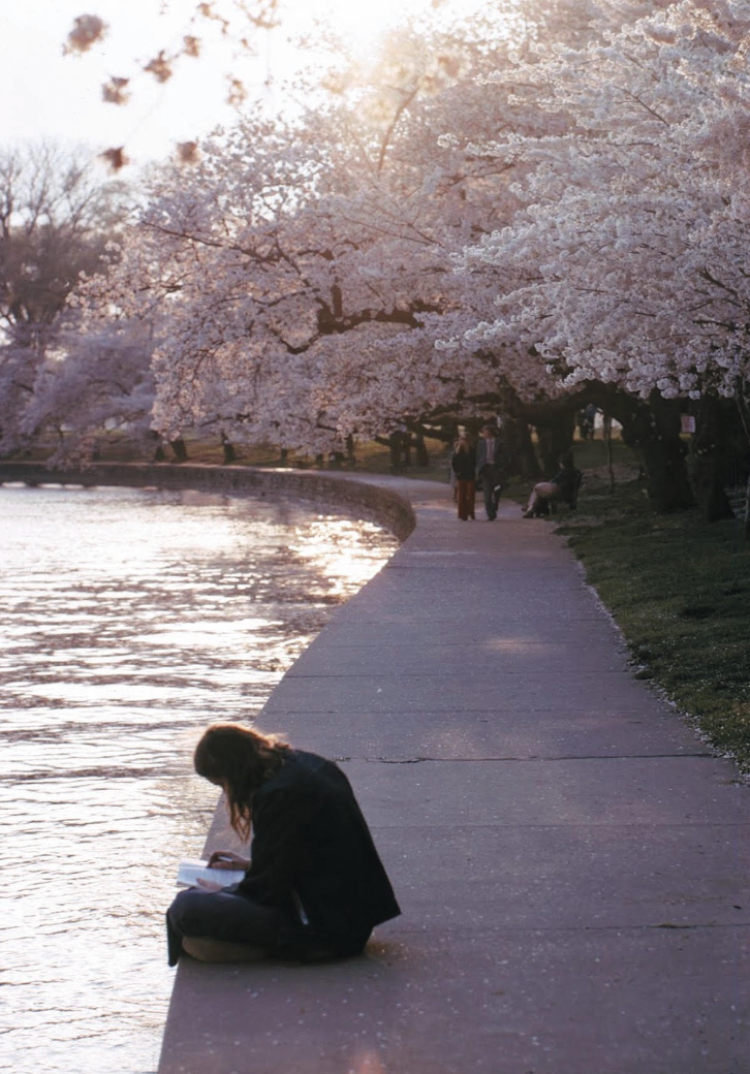There are moments in life—both spiritual and intellectual—that are like no other. They change us. They redirect us. They complete us. Between these moments of enlightenment—all of which are relatively rare—we simply go from one life event, one change point to another. But after such times of acute insight, life takes on a different hue.
Enlightenment is a matter of coming to see life—to see ourselves—differently. It transforms us from average, everyday kind of people to people with a purpose in life.
Sometimes it is the moment in life when we simply know, absolutely know, that the person we have just met is the person we are going to marry. Or sometimes it is the awareness that what we studied so hard to become is not what we are going to be. Or it might be the awareness that where I am is not where I belong. For me, it had to do with coming to understand that I would spend my entire life simply following the Presence of God that consumed me more than anything else I could imagine in life. I dedicated my life to trying to unravel what that entailed in the present world and passing on those thoughts to others.
Where these moments of Enlightenment come from are seldom able to be identified with any kind of certainty. They just are. They are within us, unspoken and often unseen, but never unknown. They strike us like lightning and burn within us all our lives. We recognize them when they happen to us but we would never have planned them.
Perhaps it is exactly a new vision that is true of all enlightenment: it drives us beyond the obvious and reveals itself to us slowly. It is something to be developed in us, not something that evaporates on the spot.
Enlightenment comes from outside ourselves. It is not a plan; it’s a happening. It fills us with new light. It astounds those around us to see us change our lives so suddenly, so totally. And in the end, it changes the focus, the direction, the very center of our lives.
MONDAY, MAY 1: Enlightenment requires complete abandonment of past certainties so that new possibilities can become possible.
TUESDAY, MAY 2: When we open our hearts to life as it is rather than insist on life as we want it, we open our hearts to life yet to be lived.
WEDNESDAY, MAY 3: There is a light within us that struggles for recognition. It is the dull and nagging awareness that we are not doing what we are meant to do.
THURSDAY, MAY 4: Enlightenment, a change in spiritual perspective, comes suddenly but unfolds a bit at a time. We become accustomed to it in small portions. As Idries Shah, the Sufi author teaches, “Enlightenment must come little by little, otherwise it would overwhelm.”
FRIDAY, MAY 5: When enlightenment comes, certainty comes. When certainty comes, peace comes.
SATURDAY, MAY 6: The enlightened know the difference between what is important in life and what is merely good about it.
SUNDAY, MAY 7: To be enlightened is to care more about cultivating depth in life than simply expanding the breadth of it. It is easy to collect experiences; it is crucial to understand the meaning of them.
MONDAY, MAY 8: Appreciating what we have in a world more given to consumption than to joy is enlightenment.
TUESDAY, MAY 9: Enlightenment is about living the little
things in life to the hilt. “The most beautiful things in the world,” Helen Keller says, “cannot be seen or even touched. They must be felt within the heart.”
WEDNESDAY, MAY 10: To be enlightened does not mean that we never make mistakes. It means that we have the wisdom to realize that even mistakes have something to do with making us the best that we can be.
THURSDAY, MAY 11: Enlightenment is what enables us to dis- criminate between what is fascinating and what is valuable. As Einstein says, “There are only two ways to live your life. One is as though nothing is a miracle. The other is as if everything is.”
FRIDAY, MAY 12: Don’t be afraid to think differently than others do. Fear only that you will be closed to what the light in everyone else has to do with the quality of your own.
SATURDAY, MAY 13: To be perfectly satisfied with who we are within is to be dark of soul. As Ralph Waldo Emerson puts it: “Though you may travel the world to find the beautiful, you must have it within you or you will find it not.”
SUNDAY, MAY 14: To be enlightened means that we come to
understand that we ourselves do not contain all the light of the world.
MONDAY, MAY 15: There is never the need to fear the darkness of evil when your own heart is full of the light of life. “You are today,” James Allen says, “where your thoughts have brought you and you will be tomorrow where your thoughts take you.”
TUESDAY, MAY 16: When you can see possibility where others see nothing at all, that is enlightenment.
WEDNESDAY, MAY 17: Nothing created has been created without value. The enlightened are those who are able to see what it is.
THURSDAY, MAY 18: Enlightenment is coming to recognize the difference between what is worth the spending of a life and what is not. “There are many paths to enlightenment,” Lao Tzu says. “Be sure to take one with a heart.”
FRIDAY, MAY 19: Life is full of miracles disguised as the ordinary. enlightenment is the ability to see them in the commonplace.
SATURDAY, MAY 20: Knowledge is not Enlightenment. Accruing information is a skill of the mind; Enlightenment, on the other hand, is a virtue of the soul. “Knowing others is wisdom,” Lao Tzu says, “Knowing the self is enlightenment.”
SUNDAY, MAY 21: It is possible to live forever in self-imposed darkness. Just by refusing to venture into the unknown idea, for instance, we can lock ourselves out of the fullness of life.
MONDAY, MAY 22: To be enlightened requires the courage to think new thoughts. At the same time, it is the willingness to accept them without scrutiny that really imprisons the soul.
TUESDAY, MAY 23: There is a different light in us all. We’re born with it. When we release it within us, all the lights in the world around us shine even brighter themselves.
WEDNESDAY, MAY 24: To be filled with the fire of life is to be grounded in goodness and freed by the spirit to do more than life would normally expect of us.
THURSDAY, MAY 25: The enlightened live life as if there was nothing more than what they can see and nothing greater than what they can’t see. Eden Phillpotts says of it, “The universe is full of magical things waiting for our wits to grow sharper.”
FRIDAY, MAY 26: The enlightened are those who see through the darkness of the present moment to the values beyond it.
SATURDAY, MAY 27: Enlightenment does not come for our own sake only. It comes so that we ourselves might be a light to others.
SUNDAY, MAY 28: We know enlightenment when we see it because it discounts the average computations of worth for the sake of their inner values. “Enlightenment,” Ravi Shankar said, “is the journey back from the head to the heart.”
MONDAY, MAY 29: The enlightened never worry about what happens. They know that what does happen in life will bring at least the same joy as what was hoped for—and probably more.
TUESDAY, MAY 30: Enlightenment is the star within us that points us to the fullness of ourselves, the person we were created to be.
WEDNESDAY, MAY 31: Enlightenment is the beginning of heaven on earth. It is the sign that we have finally come to recognize God in the human. Then we are ready to melt into the Divine. Or as Thich Nhat Hanh says it, “There is no enlightenment outside of daily life.”
LET’S SHARE OUR THOUGHTS
The following discussion questions, Scripture echo, journal prompts, and prayer are meant to help you reflect more deeply on The Monastic Way. Choose at least two suggestions and respond to them. You may do it as a personal practice or gather a group interested in sharing the spiritual journey.
DISCUSSION QUESTIONS
1. Sister Joan writes of enlightenment as a rare moment in life that changes us, gives us a new insight, a new vision that directs our life. Can you trace one such moment in your life?
2. Which daily quote in The Monastic Way is most meaningful to you? Why? Do you agree with it? Disagree? Did it inspire you? Challenge you? Raise questions for you?
3. After reading The Monastic Way write one question that you would like to ask the author about this month’s topic.
4. Joan Chittister uses other literature to reinforce and expand her writing. Find another quote, poem, story, song, art piece, novel that echoes the theme of this month’s Monastic Way.
5. Here are two Zen sayings. Choose one saying and discuss it in light of what Sister Joan writes about Enlightenment.
• Now that I’m enlightened, I’m just as miserable as ever.
• Before enlightenment, chop wood, carry water. After enlightenment, chop wood, carry water.
JOURNAL PROMPTS
Prompt 1: Here are a few statements from this month’s Monastic Way. Choose one that is most helpful to you and journal with it.
- There is a different light in us all.
- Enlightenment is the ability to see miracles in the commonplace.
There are many paths to enlightenment. Be sure to take one with a heart.—Lao Tzu
Prompt 2: Spend a few minutes with this photograph and journal about its relationship to this month’s Monastic Way. You can do that with prose or a poem or a song or...
SCRIPTURE ECHO
Who is wise and understanding among you? Let them show it by their good life, by deeds done in the humility that comes from wisdom.” - James 3:13
Who is one wise person you have known? How did you recognize their wisdom?
PRAYER
Every worthwhile gift, every genuine benefit comes from above, descending from the God of heavenly luminaries, who cannot change and who is never shadowed over. God wills to bring us to birth with a word spoken in truth so that we may be a kind of first fruits of creation.
— Hebrews 1:17-18

 Artwork: by Donald Kurtz
Artwork: by Donald Kurtz




